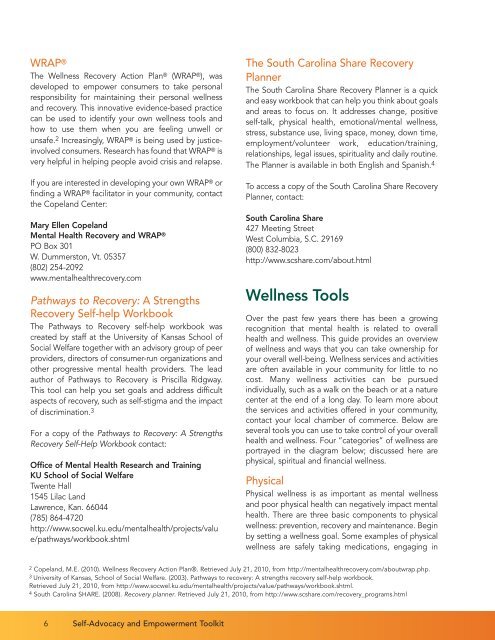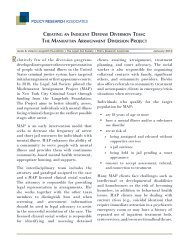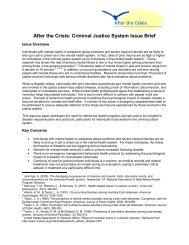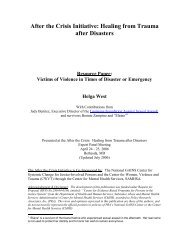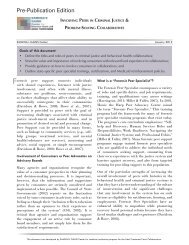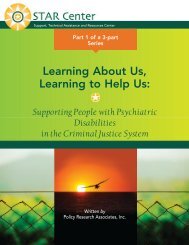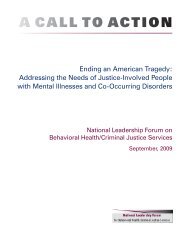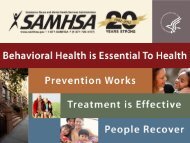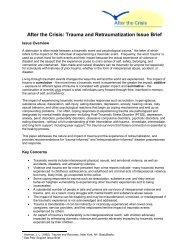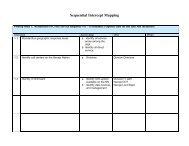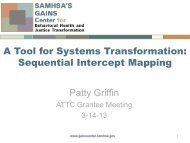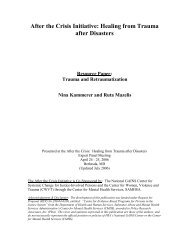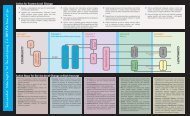Self-Advocacy and Empowerment Toolkit - STAR Center
Self-Advocacy and Empowerment Toolkit - STAR Center
Self-Advocacy and Empowerment Toolkit - STAR Center
You also want an ePaper? Increase the reach of your titles
YUMPU automatically turns print PDFs into web optimized ePapers that Google loves.
WRAP ®<br />
The Wellness Recovery Action Plan ® (WRAP ® ), was<br />
developed to empower consumers to take personal<br />
responsibility for maintaining their personal wellness<br />
<strong>and</strong> recovery. This innovative evidence-based practice<br />
can be used to identify your own wellness tools <strong>and</strong><br />
how to use them when you are feeling unwell or<br />
unsafe. 2 Increasingly, WRAP ® is being used by justiceinvolved<br />
consumers. Research has found that WRAP ® is<br />
very helpful in helping people avoid crisis <strong>and</strong> relapse.<br />
If you are interested in developing your own WRAP ® or<br />
finding a WRAP ® facilitator in your community, contact<br />
the Copel<strong>and</strong> <strong>Center</strong>:<br />
Mary Ellen Copel<strong>and</strong><br />
Mental Health Recovery <strong>and</strong> WRAP ®<br />
PO Box 301<br />
W. Dummerston, Vt. 05357<br />
(802) 254-2092<br />
www.mentalhealthrecovery.com<br />
Pathways to Recovery: A Strengths<br />
Recovery <strong>Self</strong>-help Workbook<br />
The Pathways to Recovery self-help workbook was<br />
created by staff at the University of Kansas School of<br />
Social Welfare together with an advisory group of peer<br />
providers, directors of consumer-run organizations <strong>and</strong><br />
other progressive mental health providers. The lead<br />
author of Pathways to Recovery is Priscilla Ridgway.<br />
This tool can help you set goals <strong>and</strong> address difficult<br />
aspects of recovery, such as self-stigma <strong>and</strong> the impact<br />
of discrimination. 3<br />
For a copy of the Pathways to Recovery: A Strengths<br />
Recovery <strong>Self</strong>-Help Workbook contact:<br />
Office of Mental Health Research <strong>and</strong> Training<br />
KU School of Social Welfare<br />
Twente Hall<br />
1545 Lilac L<strong>and</strong><br />
Lawrence, Kan. 66044<br />
(785) 864-4720<br />
http://www.socwel.ku.edu/mentalhealth/projects/valu<br />
e/pathways/workbook.shtml<br />
The South Carolina Share Recovery<br />
Planner<br />
The South Carolina Share Recovery Planner is a quick<br />
<strong>and</strong> easy workbook that can help you think about goals<br />
<strong>and</strong> areas to focus on. It addresses change, positive<br />
self-talk, physical health, emotional/mental wellness,<br />
stress, substance use, living space, money, down time,<br />
employment/volunteer work, education/training,<br />
relationships, legal issues, spirituality <strong>and</strong> daily routine.<br />
The Planner is available in both English <strong>and</strong> Spanish. 4<br />
To access a copy of the South Carolina Share Recovery<br />
Planner, contact:<br />
South Carolina Share<br />
427 Meeting Street<br />
West Columbia, S.C. 29169<br />
(800) 832-8023<br />
http://www.scshare.com/about.html<br />
Wellness Tools<br />
Over the past few years there has been a growing<br />
recognition that mental health is related to overall<br />
health <strong>and</strong> wellness. This guide provides an overview<br />
of wellness <strong>and</strong> ways that you can take ownership for<br />
your overall well-being. Wellness services <strong>and</strong> activities<br />
are often available in your community for little to no<br />
cost. Many wellness activities can be pursued<br />
individually, such as a walk on the beach or at a nature<br />
center at the end of a long day. To learn more about<br />
the services <strong>and</strong> activities offered in your community,<br />
contact your local chamber of commerce. Below are<br />
several tools you can use to take control of your overall<br />
health <strong>and</strong> wellness. Four “categories” of wellness are<br />
portrayed in the diagram below; discussed here are<br />
physical, spiritual <strong>and</strong> financial wellness.<br />
Physical<br />
Physical wellness is as important as mental wellness<br />
<strong>and</strong> poor physical health can negatively impact mental<br />
health. There are three basic components to physical<br />
wellness: prevention, recovery <strong>and</strong> maintenance. Begin<br />
by setting a wellness goal. Some examples of physical<br />
wellness are safely taking medications, engaging in<br />
2 Copel<strong>and</strong>, M.E. (2010). Wellness Recovery Action Plan®. Retrieved July 21, 2010, from http://mentalhealthrecovery.com/aboutwrap.php.<br />
3 University of Kansas, School of Social Welfare. (2003). Pathways to recovery: A strengths recovery self-help workbook.<br />
Retrieved July 21, 2010, from http://www.socwel.ku.edu/mentalhealth/projects/value/pathways/workbook.shtml.<br />
4 South Carolina SHARE. (2008). Recovery planner. Retrieved July 21, 2010, from http://www.scshare.com/recovery_programs.html<br />
6 <strong>Self</strong>-<strong>Advocacy</strong> <strong>and</strong> <strong>Empowerment</strong> <strong>Toolkit</strong>


